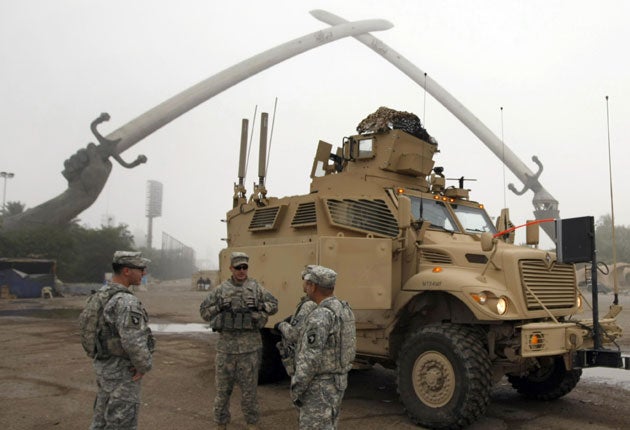Iraq repairs Saddam's triumphal sword arch

Officials in Iraq have begun to restore the notorious "Hands of Victory" arch in Baghdad, enraging many who see the massive bronze sculpture commissioned by Saddam Hussein to mark the war with Iran as a symbol of the brutality and excesses of his long rule.
The sculpture's fists were modelled on the dictator's own hands, and its restoration is part of a multi-million-dollar project to beautify the city ahead of an Arab League meeting in Baghdad later this year. The imposing 140ft monument – commissioned at the height of the 1980-1988 Iran-Iraq war – fell into disrepair after the US-led invasion ousted Saddam in 2003, and was partially dismantled four years ago.
Saddam commissioned the arch in 1985 and rode beneath it on a white horse to mark its completion. Around the base of the arms are 5,000 Iranian helmets said to be taken from the battlefield, while Saddam said the blades of the swords were moulded from the guns of Iraqi soldiers. Iraqi officials told The New York Times they did not want to remove all signs of a significant period in the country's history.
"We are civilised people and this monument is part of the memories of this country," said Ali al-Mousawi, a spokesman for the Prime Minister, Nouri al-Maliki.
Yet while most Iraqis are pleased to see money being spent on improving roads and pavements in a country ravaged by war, the arch's restoration has raised the hackles of some politicians at a time of increased violence and tensions ahead of the complete withdrawal of US soldiers by the year's end.
"It will bring back the bad memories to people," said Samira al-Mousawi, a member of Mr Maliki's bloc in parliament. "It is not acceptable to bring it back."
Even Mohammed Ghani Hikmat, the sculptor who completed the monument, admitted: "Talking about this now raises questions for me." For others, it was purely a matter of taste. "It is vulgar, but vulgar in an unspeakably horrible, terrible – and therefore unique – way," said Hakim al-Zamili, a leader of the political movement of Shia cleric Muqtada al-Sadr.
Join our commenting forum
Join thought-provoking conversations, follow other Independent readers and see their replies
Comments
Bookmark popover
Removed from bookmarks